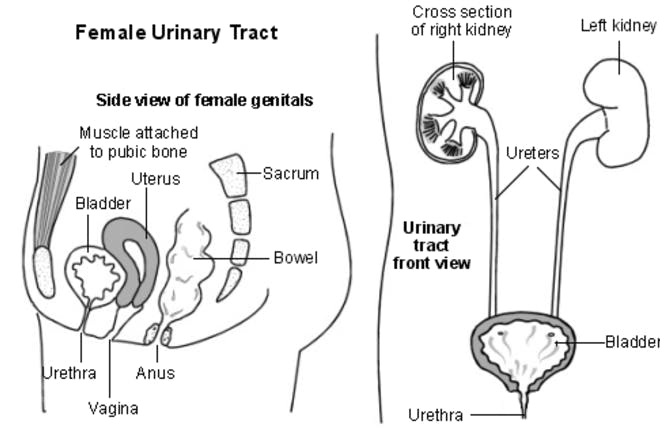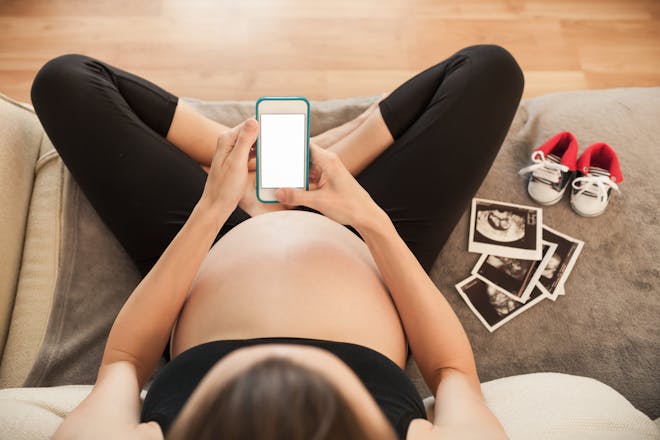If you're pregnant and have a constant urge to wee (even more than usual) or a burning sensation when you do go, you could have a urinary tract infection (UTI). During pregnancy, it's important to get it treated as soon as possible, so make sure you know the signs and symptoms to look out for.
This page contains affiliate links, which means we may earn a small amount of money if a reader clicks through and makes a purchase. All our articles and reviews are written independently by the Netmums editorial team.
What causes UTIs in pregnancy?
There are a number of reasons why UTIs – also called bladder infections or cystitis – are so common during pregnancy, explains consultant urological surgeon and medical panellist for Bladder Health UK , Mr Ased Ali .
He says:
'Broadly speaking it boils down to the effects of progesterone (a pregnancy hormone).'
FREE NEWBORN NAPPIES
In a nutshell, this hormone can affect the tubes that connect the kidneys to the bladder (called the ureters), making it easier for bacteria to make its way up the tube and into the kidney.
Another reason UTIs are common in pregnancy is because the bladder gets more and more squashed as the uterus gets bigger so it doesn't empty as effectively, which can make women more prone to infection.
It's thought about four in every 100 pregnant women develop a UTI.
What are the signs and symptoms of UTI in pregnancy?
'Although midwives will regularly check your urine sample for evidence of a UTI, you can have one without signs in the urine. Symptoms are therefore the most important method of diagnosing a UTI,' says Mr Ali.
The typical symptoms of a bladder infection are:
- pain when passing urine
- going to pass urine more frequently than usual (remember women often pass urine more frequently during pregnancy anyway, but we mean a sudden change)
- increased urge to pass urine (remember women do often get more urgency during pregnancy but again we're talking about a change)
- blood in the urine
- pain over the bladder
- change in urine smell.
Additional symptoms that occur when infection has gone into the kidney include:
- fever
- shivering
- vomiting
- pain in the loins.
'If a pregnant women begins to get any of these symptoms, she should seek medical advice,' says Mr Ali.
'The bacteria that cause urinary infections double in number around every 20 minutes, so it really isn't a good idea to delay getting diagnosed and treated.'
Will a UTI affect my baby?
'Any urinary tract infection (UTI) has the potential to be serious if not treated. However, in pregnancy, this is much a bigger risk,' says Mr Ali.
If it's left untreated, a UTI in pregnancy can:
- trigger an early labour
- mean you're more likely to have a smaller baby.
UTIs in pregnancy are also more likely to spread from the bladder up the ureter tube and cause a kidney infection (which is a more serious condition).
This is one of the reasons urine testing at your antenatal appointments are so useful. When your midwife asks you to bring along a urine sample, and tests it with a dipstick, she's checking for any trace of a UTI (among other things), so make sure you take that trusty pot of wee with you each time.
If you test positive for a UTI, you'll be advised to take a course of antibiotics, even if you're not experiencing any symptoms.
How can I treat a UTI safely in pregnancy?
If you're pregnant and think you may have a UTI, such as cystitis, the NHS advises booking an appointment with your GP.
That way they can make sure you go on suitable antibiotics (that are safe to take during pregnancy) so it's treated as quickly and as safely as possible.
If you've had a UTI before you were pregnant, you may have chosen not to take antibiotics, as it often clears up on its own. However, if you are pregnant, your GP will probably recommend you treat it with antibiotics straight away to avoid taking any risk with complications.
Some women who have frequent infections may be advised to take a low dose of antibiotics every day during their pregnancy, but this isn't necessary for most women.
How can I avoid getting another UTI?
Unfortunately, UTIs can come back at any point during your pregnancy.
'Drinking water and remaining well hydrated is the best advice for trying to prevent UTIs,' says Mr Ali.
Some mums also find these measures helpful in preventing getting a UTI again, or in the first place:
- not using perfumed bubble bath, soap or talcum powder around your genitals – use plain, unperfumed varieties
- having a shower, rather than a bath – this avoids exposing your genitals to the chemicals in your cleaning products for too long
- going to the toilet as soon as you need to pee and always emptying your bladder fully
- always wiping your bottom from front to back when you go to the toilet
- emptying your bladder as soon as possible after having sex
- wearing underwear made from cotton, rather than synthetic material such as nylon, and not wearing tight jeans and trousers.
Make sure you go back to your GP if you suspect a UTI has returned as you'll need to have it treated again.
Did you suffer from UTIs during your pregnancy? Share your thoughts and experiences in the chat thread, below.
Related stories
Urinary tract infections in pregnancy: one mum's warning







